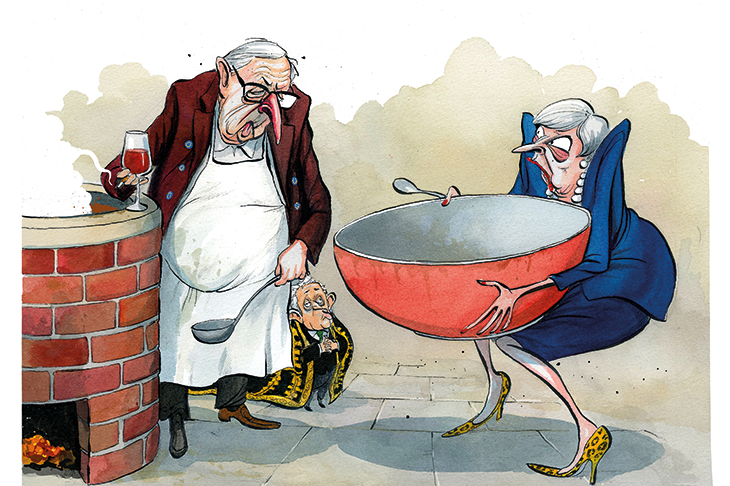The British government has lost the ability to run the country. It is no longer in charge of its own destiny, let alone that of the nation. What makes this so humiliating is that power has been ceded not to parliament, but to the European Union. The immediate future of our country will be decided in Brussels and the capitals of the EU, not in Westminster. It will be the EU that decides whether or not to offer the UK an extension to the Article 50 process, and how long it will be. Once the extension has been agreed, then parliament — which has already voted against leaving without a deal — will rubber-stamp it.
Not since Denis Healey was forced to ask the International Monetary Fund for an emergency loan in 1976 has this country been so humiliated. Then the nation required an economic bailout. This time it needs a political one.
The request for an extension will go down as an IMF moment. Even before the request was issued, Theresa May’s spokesman was admitting that the country is in ‘crisis’: something that governments normally go to almost any length to avoid admitting. No. 10 seemed almost keen to emphasize the point, as it tried to shift the blame onto the Commons.
There are an uncanny number of similarities between today’s crisis and 1976. In both cases, we see a divided cabinet which repeatedly refused to face up to hard choices — a problem compounded by the tightness of the parliamentary arithmetic which made it extremely difficult to get anything through the Commons.
Another similarity is how civil servants maneuvered behind the scenes to get their preferred outcome. In 1976, the Treasury overstated the true extent of the deficit. Healey later claimed that, had he been told the real figure, he wouldn’t have had to ask the IMF for the loan. In this current crisis, the Treasury ensured that no-deal planning didn’t happen until too late in the day — meaning it was not a viable political option. In both cases, we saw strategic incompetence, ending in just the result the Treasury wanted.
The 1976 crisis reshaped British politics. It ended the postwar economic consensus, exacerbated the divide in the Labour party and paved the way for Thatcherism: it meant more cuts in state spending in one year than George Osborne managed in six. What the consequences of the extension crisis will be remains to be seen. But they will be profound — and particularly for the Tory party.
It is far from clear whether the Tories can survive it. One cabinet minister insists that, ‘A majority of the Conservative parliamentary party is not going to be prepared to live with a long extension. That’s what last week’s votes showed.’ It is a reasonable point. No fewer than 187 Tory MPs voted against May’s motion to extend Article 50 last week, well over half the parliamentary party. Admittedly, this was a free vote. But it is hard to imagine that whipping it would have made much of a difference given the current state of party discipline.
This fact, together with a desire to avoid holding EU Parliament elections, are why May has only requested an extension until June 30. But there is no guarantee that this is what she’ll get.
If a lengthy Brexit extension passes parliament, it will be thanks to a huge number of Labour votes. This would make May’s position untenable. She acknowledged this when she told the Commons on Wednesday that ‘as Prime Minister, I am not prepared to delay Brexit any further than June 30’.
Under Tory rules, she cannot be challenged as leader until December — a year on from the last ballot on her leadership. But she can be challenged as Prime Minister. One minister frets that once the government is forced to delay Brexit, Jeremy Corbyn will move a no-confidence vote — and Tory rebels will sit on their hands, thinking that the fall of her government is the only sure way of getting rid of her.
Some fear that the Brexit delay could do to the Conservatives what tuition fees did to the Liberal Democrats, becoming a byword for their perfidiousness. At the very least, it calls into question Tory competence. They have known for two years when exit day was meant to be. Yet Philip Hammond now says it would be ‘physically impossible’ to leave on March 29. Whose fault is that? Many voters will suspect that some cabinet members (such as Hammond) are quite happy with their failure. Indeed, Andrea Leadsom questioned whether ministers really wanted to deliver Brexit at this week’s cabinet meeting. If ministers are asking this question, Tory voters will too — and at some cost to the party.
If we stay in the EU long enough, the Tories will have to fight European parliament elections. It will be the opportunity for the mother of all protest votes. Even before Brexit, these elections were used as a good chance to kick the established parties: Ukip won in 2014, and in 2009 Labour — the UK’s governing party — came third.
This time round, the campaign would be a disaster for both main parties. We can expect a Brexit party to run on a ‘Just Leave’ platform. Ukip might have lost all organizational coherence but it’s still polling at 17 percent — despite its shift to the deeply unsavory right in recent years. The list system used to elect MEPs would help this Brexit party win seats. It could then use the European parliament as a campaigning base, the way Nigel Farage once did. On the Remain side, pro-second referendum parties will attack Labour for its equivocation on this point, and prosper from doing so.
In No. 10, there is still optimism that they can win approval for May’s deal and avoid a drawn-out Brexit. They hope to hold a meaningful vote next week (if John Bercow permits it), win it and then need only a short extension to get the necessary legislation through. This would mean that the UK was out before the EU elections.
The path to doing this, though, is narrow. The government has made some progress in assuaging the DUP’s concern that a future Prime Minister might break away from EU rules by leaving Northern Ireland to follow them while Great Britain diverges — leading to an east-west border. But the issue is far from settled. I understand that the DUP have spoken to Boris Johnson and Dominic Raab about this (both men are still refusing to back May’s deal) and were not entirely reassured by the answers they received. The government must now persuade Johnson and Raab of what they are offering the DUP, in order to get the DUP on board.
This makes it much harder to get the domino effect going that the government needs to pass the deal.
Some Brexiteer rebels might come over to May’s deal if they think the alternative is a long delay, or a softening of Brexit. But this would probably require May being prepared to say that she’ll go. When Johnson asked the Prime Minister what would change in the second (post-withdrawal agreement) phase of the negotiations in a meeting on Tuesday, she told him that the Brexit department would have more autonomy from No. 10. But this kind of organizational change won’t win May many, if any, votes. What’s needed is for her to promise to go if her deal passes. If that would get the agreement over the line — delivering an orderly and relatively timely withdrawal — it would be irresponsible of her not to.
If the Tories want to know what the future will hold if they don’t pass the Brexit deal and end up in a lengthy extension, then they should look at what happened to Labour after 1976. The Callaghan government ended up drawing down only half the loan and were free of the IMF a year later: ‘Sod Off Day’ as Healey called it. But the extension destroyed Labour’s claims to competence, drove a wedge between them and their natural supporters the unions, and led to them being out of power for 18 years. The question now, is whether the Tories can avoid this fate.
This article was originally published in The Spectator magazine.


















